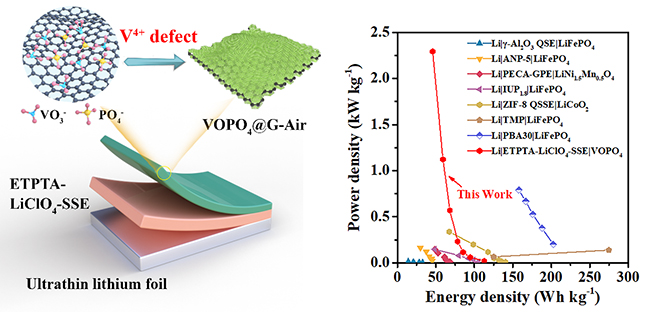Multi-electron reaction is defined as a reaction in which more than one electron is transferred per active materials molecule. VOPO4, a typical class of multi-electron reaction cathode materials with V4+/V5+ and V3+/V4+ multiple redox couples, possesses a higher potential with the introduction of more electronegative (PO4)3- anion, which can provide enhanced energy density.
However, the vanadium phosphates suffer from unsatisfactory performance, especially for high rate capability due to the bulk diffusion process and low intrinsic electrical conductivity.
Recently, a research team led by Prof. WU Zhong-Shuai from the Dalian Institute of Chemical Physics (DICP) of the Chinese Academy of Sciences has developed a high-performance 2D pseudocapacitive multi-electron reaction lithium storage materials via V4+ defect engineering for solid-state lithium metal batteries with high energy density and high power density.
This study was published in Advanced Energy Materials on April 9.

Schematic of Li||ETPTA-LiClO4-SSE||VOPO4 solid-state lithium metal battery and the corresponding Ragone plot(Image by XING FeiFei)
The researchers realized the high-rate pseudocapacitive cathode with multi-electron reaction chemistry by regulating V4+ defect in VOPO4. The as-prepared 2D VOPO4/graphene nanosheets not only had an ultrathin nanosheet structure to improve electronic and ionic conductivity, but also adjusted the uniformity of multi-electron reactions and reduced polarization by controlling the content of V4+ defects.
The pseudocapacitive multi-electron reaction cathode exhibited a high capacity of 313 mAh g-1 at 0.1 C and maintained a capacity of 116 mAh g-1 at an ultrafast rate of 50 C.
The researchers further synthesized a novel UV-curable solid electrolyte (ETPTA-LiClO4-SSE), which had an ion conductivity of 0.99 mS cm-1 at room temperature. This was much higher than that of polyethylene oxide solid electrolytes (~10-6 S cm-1). The assembled Li||ETPTA-LiClO4-SSE||VOPO4 solid-state lithium metal battery presented a high energy density of 85.4 Wh kg-1 and a high power density of 2.3 kW kg-1.
What's more, the as-assembled solid-state lithium metal batteries pouch cell displayed good flexibility and safety.
"Our study provide a new avenue for the development of 2D pseudocapacitive fast-charging cathodes with multi-electron chemistry for high specific energy and high power lithium metal batteries," said Prof. WU.
This study was supported by the National Natural Science Foundation of China, and DICP Innovation Fund.